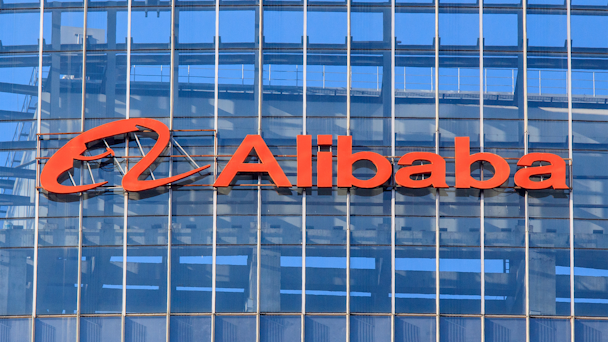Alibaba responds to ChatGPT mania with its own AI-powered chatbot
The launch arrives during a moment of mounting technological tension between the US and China as experts and governments struggle to come to grips with the rapidly growing power of AI.

Alibaba currently ranks as the third wealthiest company in China. / Adobe Stock
Alibaba is getting into the booming generative AI business.
During the Alibaba Cloud Summit on Tuesday, the Chinese tech giant revealed its response to ChatGPT, the AI-powered chatbot which quickly became a viral sensation after its launch in late 2022 by the San Francisco-based AI lab OpenAI.
Dubbed, rather philosophically, Tongyi Qianwen – which translates approximately to “seeking truth from a thousand questions” – Alibaba’s new AI model will soon be incorporated into the company’s full suite of apps, according to multiple reports. The model model will reportedly first be integrated into the company’s professional messaging and voice assistant platforms, called DingTalk and Tmall Genie, respectively.
Alibaba is presently the third wealthiest company in China, according to data from Companies Market Cap, a website that tracks the value of publicly listed companies.
Advertisement
Like GPT-4 – the technological framework behind ChatGPT – Tongyi Qianwen is a large language model, or LLM. Such models are trained to generate particular outputs from enormous quantities of data. In the case of ChatGPT and Tongyi Qianwen, that output is language; users ask question via text-based prompts and the models will generate responses using statistical probability to determine which words should be placed where.
Chinese tech company Baidu also released its own AI-powered chatbot, named Ernie Bot, in March.
The mounting efforts from Chinese companies to develop new AI technology follows a push last near from Shanghai – China's most populous city – to position itself as a pioneering force in the metaverse, an abstract virtual world that commanded the attention of much of the marketing world in 2022 but has since largely been eclipsed by AI. Last July, the city's government revealed plans to devote around $1.5bn to metaverse-related efforts.
Leading Chinese tech companies, including Alibaba, also invested heavily in metaverse-related projects last year.
Advertisement
Fears amid an escalating AI arms race
Following its launch in November, ChatGPT became - according to some estimates - the fastest growing consumer product in history.
The tool’s unprecedented capabilities and rapid rise into pop culture superstardom have captivated the attention of professionals across a number of industries, including marketing. But they’ve also sparked concern.
The Italian Data Protection Watchdog, known also as Garante, temporarily banned the tool in the country last month, declaring in a statement that there “appears to be no legal basis underpinning the massive collection and processing of personal data in order to ‘train’ the algorithms on which the platform relies.” The organization also cited concerns about a lack of age restrictions within ChatGPT. (OpenAI's Terms of Use state that no one under the age of 13 is allowed to use the company's services, but ChatGPT does not currently have any kind of age verification system within the registration process.)
Concerns have also been raised about the tendency for AI models like ChatGPT to ‘hallucinate,’ or generate factually incorrect information with the veneer of truth. Author Yuval Noah Harari, whose writing has emphasized the power of language to both empower and manipulate human beings, warned in a recent op-ed published by The New York Times that “simply by gaining mastery of language, A.I. would have all it needs to contain us in a Matrix-like world of illusions, without shooting anyone or implanting any chips in our brains.”
Harari was one of the signatories – alongside tech icons like Elon Musk and Steve Wozniak – of a recently published open letter urging the AI community to stop training any models “more powerful than GPT-4” for at least six months, citing existential risks to humanity. (The letter has also been signed, incidentally, by at least four Alibaba employees).
The letter argues that the arms race among major tech companies like Google and Microsoft to produce increasingly powerful AI models is escalating at a dangerously rapid clip.
Suggested newsletters for you
'We' and 'they'
In his op-ed, Harari flags concerns that slowing down that AI arms race in the West could ultimately give China the upper hand, claiming that such fears are ultimately misguided: “The deployment and entanglement of uncontrolled AI into society, unleashing godlike powers decoupled from responsibility, could be the very reason the West loses to China,” he writes.
China’s push into AI has been hindered by a lack of graphic processing units, or GPUs, a crucial ingredient for the construction of LLMs. In September, the US government banned US companies Nvidia and AMD from selling GPUs to China and Russia. Nvidia later introduced a modified version of one of its GPUs in order to skirt the US sanctions, according to a report from The Wall Street Journal.
For years, US government officials have fretted over the prospect of a Chinese AI program. In January, FBI Director Christopher Wray voiced his concerns during a panel at the World Economic Forum in Davos, Switzerland: “AI is a classic example of a technology where I have the same reaction every time,” he said. “I think, ‘Wow, we can do that?’ And then I think, ‘Oh god, they can do that.’”
The Cyberspace Administration of China, the governmental arm that regulates the internet within the country, issued new rules on Tuesday intended to control the spread of generative AI tools. In addition to mandating that these tools adhere to domestic data security laws, the new rules also stated that the tools must be developed and used according to “core socialist values,” according to a report from Reuters.
For more on the latest happening in AI, web3 and other cutting-edge technologies, sign up for The Emerging Tech Briefing newsletter here.

